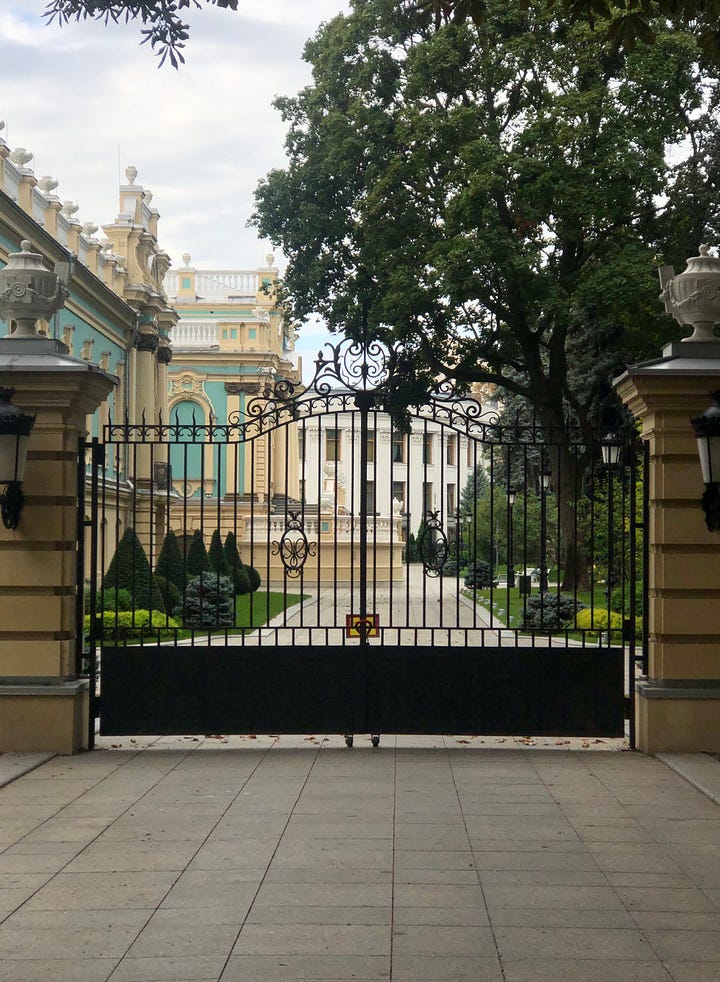



Gatekeeper Bias And How It Impacts Everything
A copy of an article posted on medium.dom 23rd March 2023, by Peter Burns.
The views of a few select people influence what you see and do.


In ancient Egyptian mythology, the way to the underworld was dotted by a series of gates. Each was guarded by its own gatekeeper. When a person died, they had to undergo a journey through all these gates, to be judged at each, and every one of them.
The fate of the deceased was in the hands of the gatekeepers. In order to pass, the dead had to recite a series of names and spells. If the guardians of the gates thought they were not worthy, they could tear them to pieces, erasing their souls from existence.
And what was one reason for being sent to suffer torment in a lake of fire by one of these gatekeepers? If you didn’t know their secret name.
Sharpest of Them All. Rejector of Rebels. Existing on Maggots. These were some of the names of the minor gods guarding the gates.
If you managed to get to their gate, and forgot what they were called, not only would you get rejected from passing through, you would also suffer countless horrors before ceasing to exist.
Poof. Erased out of existence. Forever.
* * *
Modern keepers of the gates
Modern life is a bit like the ancient Egyptian journey through the underworld. You are constantly passing through gates, each guarded by various gatekeepers.
These guardians, often unseen, have tremendous power over your life. One example: Getting a job. First your CV has to be selected by a recruiter. Then they interview you. If you pass this stage, then you get an interview with the company.
The entire process is a series of gates you have to pass through, each manned by a sentry. Lately, more and more of these aren’t even human. And no, I don’t mean that some fantastic ancient Egyptian god has taken up the task of asking where you see yourself in five years.
Rather, it’s artificial intelligence (AI). Now, many of these activities are increasingly being determined by the algorithm. An all-mighty force. It can select which candidate gets called up for a chat, and which one stays forgotten.
You encounter algorithms every time you surf the web. They decide what content you see, and which things get buried deep in the netherworlds of the internet. Never to be encountered by you.
The online world has become the new frontier. It has totally redefined how people interact, and how they consume information. And it’s not just the algorithms. Individual humans still play a defining role in determining what gets seen, and what doesn’t.
* * *
The biases of the gatekeepers
The world wide web is divided into various communities, large and small. While they are supposed to be all about the users, two types of individuals actually dominate: moderators and editors.
Each of these plays a different role. A moderator determines which specific piece of content doesn’t get seen. The editor on the other hand, decides what gets seen by everyone.
Just like the strange creatures guarding the gates in the afterlife in ancient Egyptian mythology, the moderators and editors have the power to tear up or slowly suffocate a piece of work, an item of news, or an idea.
They are the gatekeepers. And while they might think of themselves as minor gods, they are human. All too human.
They have their tastes, their worldviews, and their biases. Often, something doesn’t float unto the surface just because it doesn’t fit into the narrow blinders of the gatekeeper. No matter if it’s good or bad.
Bad content can get wide play, while good content can disappear. Just because one fits the editor’s confirmation bias, and the other doesn’t.
With confirmation bias, the brain searches for things that fit its pre-conceived notions. The mind is already made up even before it looks at the evidence.
If a deity gatekeeper like Existing on Maggots thinks maggots are the best thing since sliced bread, it will ignore any articles arguing to the contrary. Yet, an article raving about the nutritional value of the slithering critters will surely catch its attention.
Similarly, if Rejector of Rebels is the editor creature charged with selecting political articles to promote, it will pick the ones that fit its own political views. All dissenting rebel articles will burn in the eternal hell of oblivion.
* * *
How gatekeeper bias impacts what you see
Gatekeeping is not just about the individual pieces of content, but also about the overall message. Individual gatekeepers will often keep on picking material with a similar tone.
The process is wholly subjective. It creates a narrow window that organizes the information you see.
In his book The Uncensored War, journalism historian Daniel Hallin divided political discourse (and hence its coverage) into 3 concentric spheres: sphere of consensus, sphere of controversy, and sphere of deviance.
On their platforms, gatekeepers create a sphere of consensus that fits their biases. This type of material gets actively promoted.
Things that don’t fit, but are considered acceptable, get a different treatment. These don’t get touched, but languish with few eyeballs ever coming across them. Finally, you have things so beyond the pale, that they get taken down.
Each platform, whether it’s a newspaper, forum, or a multi-person blogging site, then end up reflecting the biases of the powers to be. This attracts people who support these views, further reinforcing the effect.
A similar dynamic also manifests itself in the art world. Historically, art has been shaped profoundly by gatekeepers. It is they who determine what is art, and what is trash.
American philosopher George Dickie posited that objects aren’t art by themselves. They become art. Art can only exist in terms of an institution, the so-called "art world".
What is this? Experts, critics, curators. In other words, gatekeepers.
Whether it is the art world, or online, it is this limited number of people who determine what people read, look at, and listen to. They are the defining cog in shaping the information flows towards the rest of society.
They set the agenda. Tiziano Bonini and Alessandro Gandini in their study of gatekeepers on music streaming platforms have this to say:
"Platform gatekeepers exert a kind of "algo-torial power" that may be able, as a primary consequence, to set the "listening agendas" of global music consumers."
Thus, it is the biases, tastes, and worldviews of this limited set of people that shape what you come across. In fact, you see, read, or listen to what they want you to see, read, or listen to.
* * *
Formation of new elites
J. K. Rawling, the author of the Harry Potter series, was originally rejected by 12 publishers. Her first book was finally chosen by one publisher, Barry Cunningham, after he saw his daughter reading the manuscript with interest.
Apparently, even as he was set to publish it, he told Rawling:
"You’ll never make any money out of children’s books, Jo."
This one lucky choice transformed Rawling’s life. She is now part of the author elite. Imagine though, how close she was to failure. This selection by a gatekeeper was fundamental for her success.
Gatekeeping creates elites. The fact of being chosen can launch a person to greater heights. Unfortunately, this also impacts those who are overlooked. Often, the only reason being that it is different from what the gatekeepers want to see.
Artist Alice Rivard wrote of her experience with this:
"I was studying arts at a rural college in Bas-Saint-Laurent. My teachers were all about abstract art. I felt like an imposter for not being into it. I was treated like an outsider because they did not like my figurative paintings."
In her essay, Rivard also described how these constant rejections were a source of her imposter syndrome. It led to a persistent questioning of her sense of self, and her own abilities.
* * *
Gatekeeping is about power
In their report, Olli Seuri and Hannu-Pekka Ikäheimo state that gatekeeping is ultimately about power:
"It ultimately comes down to power: who has the ability to influence what information reaches people and how the social reality is constructed."
Gatekeepers shape the information that reaches people. Their actions are also instrumental for the formation of a small group of elites. The superstars. The individuals everyone reads, looks at, and listens to.
In a way, this also engenders groupthink. On the individual platform, it creates a sphere of consensus, one that most creators try to adhere to.
The choice is clear. Feed into the biases of the gatekeepers, and maybe see your work promoted. Or, go the contrarian way, and risk being ignored into oblivion.
Improper gatekeeping can kill self-expression. Writers then write for the gatekeeper, rather than express their own free creative thoughts.
Often, this can be the detriment of the platform as a whole. Editors who determine content only reflect a select set of readers. Others get left out. While it can help solidify a core group of users, the result can be a lack of real growth.
Gatekeeping can also be beneficial. Let’s take one of the minor guardians of the gate in ancient Egyptian funerary texts, Eater of the Foulness from His Hindquarters (I am not making this name up).
Eater served as a sort of moderator, getting rid of foulness. Its actions helped keep the underworld clean. Today, moderation policies can serve the same function. They attempt to take out disinformation, and thus help create a healthier information space.
However, just like in ancient Egypt not everyone was equal in the afterlife, in the modern world not all creators are treated the same. The pharaohs were living gods after all. We now have our own versions of Egyptian kings and queens.
There are different ways of controlling content: banning, or promoting (boosting). Even here not everyone is created equal. The elites benefit from special treatment from the gatekeepers.
TikTok’s heating button gives artificial virality to the select, while Facebook’s program XCheck program exempts them from the moderation rules the rest of the people have to abide by.
These types of programs show how much inequality there is in the creator economy. Some people are more equal than others.
Gatekeepers play a central role here. The biases of these set the agenda. Their decisions are kingmakers. Whoever they pick will rise above the rest.
That’s the reality of how things work.
* * *